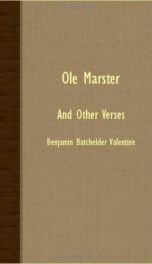ole marster and other verses

OLE MARSTER AND OTHER VERSES - 1921 - CONTENTS PAGE FOREWORD ................................. 9 OLE MARSTER .............................. I3 ..... .................... ............................ 25 ................... ..................... ...................... 33 .................... ................. ........................... ........................ KEEP ER-GRINNIN 22 DE OLE FIDDLER STUDYN CHRISMUS BOUT CHRISMUS IN MY BONES 29 32 DE OLE BATTERED BANJO WAITIN IN DE SUNSHINE IZE BOUND FER OLE HANOVER BRESII EM WAY 35 37 39 DE HOE-CAKE WALK 41 STUDYN HOW TER KEEP FRUM GITTIN SHOOK DOWN ................................. 44 GRASSHOPPERS .............................. 46 DE SHUCKIN 0 DE CORN ..................... 48 UNCLE JOE ................................. 50 LITTLE MISTISS ............................. . 53 MAM MYS CHARGE .......................... 56 ............................ 58 AFTER THE WAR THE RACE QUESTION ........................ 60 ........................... ............................. .............................. ............................. RECONSTRUCTION 64 THE PESSIMIST 66 RUMINATIONS 68 CONTENTMENT 70 THE POINT OF VIEW. ......................... 71 THE DUCK ................................. 75 THE KING CORN MAN ....................... 78 THE TRAVELLERS ........................... 80 DE POT WHAR CALL DE KITTLE BLACK ......... 84 AUNT DINAH AT THE FAIR ................... DAT BOY ................................... THE MARCH OF THE LODGES .................. SPEECH OF THE v . GABRIEL GIZZARDFORT ON THE CELEBRATION OF THE FOURTEENTH COM- MANDMENT ............................ ................ CYAR .......................... THE CIRCUS ......................... INSURANCE POLICY ................... ASTRONOMICAL OBSERVATIONS DAT LECRIC SEEING A FIRE Foreword S OUTHERN negroes brought up by Ole Mar-. ster and Ole Mistis, and even descendants of these dear, dark folk who inherited their character, manners, speech and devotion to we alls white folks are rapidly becoming mere tradition, and with them is passing from the American scene something vital, something precious. Time never was when they could have been understood, much less interpreted by any not of the soil and to the manner born-by which is meant the white people who were associated with them in a relation unique then and impossible now, whom they loved and served and who loved and served them. The survival long after The War Between the States of many instances of this relation enabled a later day to know and appreciate these humble but interesting folk. A Virginian who possessed a su- prem,e gift for interpreting them so that through his work they will live always in a world which he him- self has left, was Benjamin Batchelder Valentine. Both nature and circumstances fitted him for the work. To inherited gifts of heart and mind was added liberal culture, both intellectual and spiritual. During his formative years an ample home-an old and storied Richmond mansion, whose rooms were filled with books and treasures of artistic and sentimental value- provided the setting for wholesome family life. It was a home to which faithful colored folk contributed com- fort and dignity-a home in whose walled garden flow- ers bloomed and the laughter of the children of the house and their dusky playfellows from the servants quarters mingled with song of bird and plash of foun- tain. The head of this house was comrade, guide and example to his sons. To his servants he was the friend and protector who inspired loyalty. He would have been in earlier days an ideal Ole Marster. In such an environment Benjamin Batchelder Valen- tine learned to know by heart the old-time colored folk...
Info about the book
Author:
Series:
Unknown
ISBN:
1486149219
Rating:
4.5/5 (1)Your rating:
0/5
Languge:
English
Users who have this book
Users who want this book
What readers are saying
What do you think? Write your own comment on this book!
write a commentif you like ole marster and other verses try:
Other books by this author
Do you want to exchange books? It’s EASY!
Get registered and find other users who want to give their favourite books to good hands!

